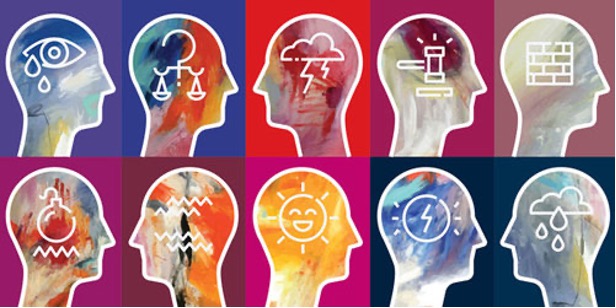On this page of the website, you’ll find information about the different groups that we offer. Groups are a big part of what we offer. Group therapy and groups that teach psychological skills can be really helpful for a wide range of difficulties. If you’re invited to participate in a group, we’ll tell you more about what to expect and you’ll have a chance to ask questions, before it begins. Participating in a group means an opportunity to get to know other people who are going through some similar challenges and who are keen to work on similar goals. Groups usually take place every week or every 2 weeks, so you’ll have a good chance to get to know each other and the group leaders.
Depending which one you join, it may involve talking about your own experiences, developing psychological skills such as mindfulness or managing our emotions, or learning more about issues such as trauma, anxiety, or depression, for example. It’s quite common to feel a bit unsure about joining a group where you don’t know anyone to begin with. But we have found that most people settle in to the group and benefit from the sessions. Some people even choose to stay in touch with each other after the group finishes, but that’s completely up to you.
To get the most out of a group, it’s great to attend as many sessions as you can, speak up and be open and honest, listen to the group leaders and the other participants, and put things into practice in your daily life. So please take your time having a look through the information on this part of the website. If you come for an assessment appointment, the therapist can discuss the group options in more detail with you. But if you like the sound of a particular group, let us know when you complete the opt-in form, or when you come to your first assessment appointment.
Therapy Groups
Emotional Resources Group
This group is for people who have experienced psychological trauma and emotional reactions that can cause them problems. The aim is to build skills and resources to help you understand and cope with strong emotions, especially when you are on your own. The group does not involve talking in detail about past personal events.
People will learn about psychological trauma and how difficult or traumatic life experiences can affect our mind, body, behaviour and emotional reactions. Participants are introduced to a new way of thinking about emotional reactions and about how we can start to change them. You will be introduced to a range of coping skills to help you manage your emotions. We expect to have approximately 10 people per course. Courses can be mixed (male and female), or male only and female only. The group runs for 7 or 8 weeks, and may be either online, or meeting together in person.
Mindful Living Course
The course is based on mindfulness meditation, which means allowing ourselves to fully experience each moment of our life. With unpleasant feelings like anxiety and depression, there is a temptation to try to push the feelings away or avoid them. This is an understandable reaction but this avoidance can actually make the feelings worse. Another way to cope with negative emotions is by allowing ourselves to fully feel them, and then allow them to pass in their own time. This helps to release us from the fear attached to the feelings. The course teaches a range of approaches you can use to bring mindfulness into your everyday life. These include meditation and physical stretches, which come from eastern religions such as Buddhism but can be safely used by people with any belief, or none.
This is a course or class rather than “group therapy”. There is no pressure to share any personal information unless people wish to. No-one will be expected to talk if they do not wish to. It is fine just to listen. Participants are valued for just being at the classes.
It is suitable for people who have never used mindfulness before, as well as people who already use mindfulness.
The course runs for 7 or 8 weeks and may be offered online, or meeting together in person.
Schema Therapy Group
This group is for individuals with long term, complex problems related to adverse childhood experiences and/or difficult relationships. The group uses techniques from schema therapy to help participants better understand their unhelpful life patterns and to change these. It is suited to people who can recognise the way their childhood experience may be contributing to their current difficulties, and are willing to talk about these.
The sessions are led by two psychologists. The group lasts for 20 weeks and may be offered online, or meeting together in person. Find out more on our Schema Group Therapy page.
Compassion Focused Group Therapy
We know from the people that attend our service, that often the things that happen to them in life can mean they hold strong negative beliefs, be very critical about themselves and can be fearful and mistrusting of the world. We know that they often feel to blame for their difficulties, but we also know that this is actually not their fault. Compassion Focussed Therapy (CFT) uses theory about how our brains have developed over time, both as humans through evolution, but also through our own life experiences. In CFT we use this knowledge to develop what we call our compassionate system, which involves developing our abilities to offer others compassion, receive compassion from others and offer compassion to ourselves.
This makes Compassion Focused Therapy perfect as a form of Group Therapy. Find out more on our Compassion Focused Group Therapy page.
Frequently Asked Questions
Will my group be in person or online?
You may be invited to join an online group, or a face to face group. Sometimes there will be a choice of either. Usually, each weekly session will be the same format – e.g. if it starts face to face, all the sessions will be face to face. When we offer the group we will let you know whether it is available online or face to face or both.
What will I have to do during the sessions?
This depends on which group you are attending. In some groups, the main focus will be on developing psychological skills. In some groups, such as schema therapy, there may be some more discussion about difficult life experiences. Every participant will have opportunities to speak in the group, to express your opinions, to discuss how things are going for you, to ask questions, etc. There will often be some discussion tasks, and the group may use videos, written material and perhaps writing some things down if you are able.
What if I’m not great with reading and writing?
Although the groups sometimes use written material, the group leaders will also be explaining things through discussion and demonstration. So it’s possible to participate well in a group even if reading and writing are tricky for you, and you won’t have to read anything out if you’re uncomfortable about that.
What if I’m anxious about being in a group or meeting new people?
This is quite common. If we think a group would be a good option for you, we will encourage you to give it a try. But if you feel strongly that a group would be too uncomfortable, you obviously don’t have to do it. Some people start a group feeling a bit anxious but by the end of the group they’re usually glad they stuck with it.
Do I have to attend all of the sessions?
To get the most benefit from the group, it’s best to attend as many sessions as you can. We understand that occasionally, illness or circumstances might get in the way of you attending. However, it’s really important to let us know in advance if you can’t attend a session. If you cancel more than one session, the group leader may discuss this with you to check if anything is getting in the way of you attending regularly.
Can I bring someone with me to the group?
This is usually not possible because the groups are only for participants. But if you are worried about attending, you can discuss this with a clinician beforehand and we’ll see what we can do to help you feel okay enough to participate.


 Emotional Resources Group
Emotional Resources Group Mindful Living Course
Mindful Living Course Schema Therapy Group
Schema Therapy Group Compassion Focused Group Therapy
Compassion Focused Group Therapy